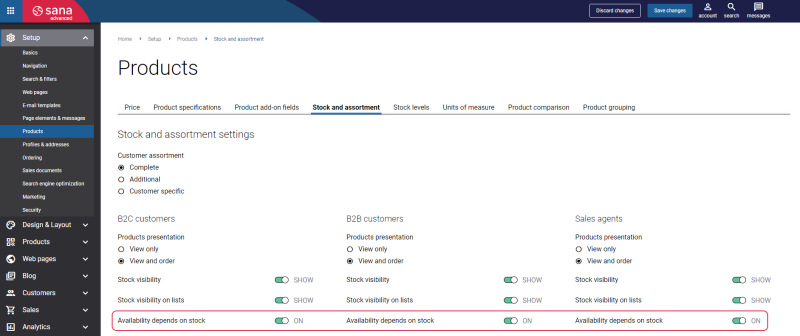Product Availability
Few things can have an influence on product availability information in the webstore. This chapter summarizes the information about those things which may influence the product availability.
1. The Availability depends on stock in Sana Admin: Setup > Products > Stock and assortment. Two options are available:
-
OFF: The availability of a product is not influenced by stock. You can order without limits.
-
ON: The availability of a product in the webstore is checked whether it is in stock or out of stock.
When a certain product is out of stock, the not available text will be shown in the webstore instead of the Add to cart button.
If you try to order the number of products which exceeds the number available in stock, you will see a message in the shopping cart: The quantities you requested are not available, and are reduced to the available quantities. This means that the quantity will be changed to that which is available in stock.
2. Visibility and orderability of products: This should be accurately configured and checked in your ERP system. This means that the webstore catalog should be correctly created and configured in the ERP system.
Use the Webshop Catalog Overview form in your ERP system to check product visibility and orderability. This form simulates the webstore behavior. If a product is not orderable, you can see the reason of this. Everything is in one place and you can do the necessary changes directly from this form. For instance, if a product is not visible you can open it from this form and make it visible.
For more detailed information about webshop catalog overview in ERP systems, see the articles listed below.
Microsoft Dynamics NAV: Webshop Catalog Overview
Microsoft Dynamics AX: Webshop Catalog Overview
Microsoft Dynamics 365 Business Central: Webshop Catalog Overview
Microsoft Dynamics 365 for Finance and Operations: Webshop Catalog Overview
SAP Business One: Web Store Catalog Overview
SAP ECC: Webstore Catalog Overview
SAP S/4HANA: Catalog Overview
3. Indexing of the product information: The Product import task is used to retrieve the product information from the database to build or update the webstore index. Therefore, when you change product information, for instance change the visibility of a product, you should run the Product import task to update the product information in the webstore.
4. Customer assortment: Webstore administrators can offer an optimized assortment of products to their customers by managing the webstore catalog that appeals to all customers as well as products targeted to individual customers. For more information, see Customer Assortment.
5. Webshop filter: Webstore administrators can use the webshop filter in the ERP system when only a subset of the webstore catalog should be visible.
For more detailed information about webshop filters in ERP systems, see the articles listed below.
Microsoft Dynamics NAV: Webshop Filters
Microsoft Dynamics AX: Webshop Filters
Microsoft Dynamics 365 Business Central: Webshop Filters
Microsoft Dynamics 365 for Finance and Operations: Webshop Filters
SAP Business One: Web Store Filters
SAP ECC: Webstore Filter
SAP S/4HANA: Webstore Filter
6. Data validation rules: The Data Validation Rules form can be used to manage data validation in your ERP system for the appropriate tables and fields. Configuration of the validation rules affects data retrieving. Thus, you can configure validation rules which will define if an item is orderable. Only data which satisfies the selected criteria can be processed.
For more detailed information about data validation rules in ERP systems, see the articles listed below.
Microsoft Dynamics NAV: Data Validation Rules
Microsoft Dynamics AX: Data Validation Rules
Microsoft Dynamics 365 Business Central: Data Validation Rules
Microsoft Dynamics 365 for Finance and Operations: Data Validation Rules
SAP Business One: Data Validation Rules
SAP ECC: Data Validation Rules
SAP S/4HANA: Data Validation Rules
